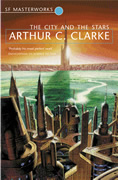I’ve been meaning to re-read some Clarke in a memorial kind of way ever since he died earlier this year. What I picked up immediately was the short story collection Of Time and Stars, the first thing of his I ever read, which holds up wonderfully. Looking along the shelf this afternoon I found myself wanting new vintage Clarke, and failing that, which I’m not going to get, one that wasn’t utterly familiar. There comes a time with authors one really likes and re-reads a whole lot when the books that were the least favourites become the favourites, because they’re the ones you can still actually read.
Against the Fall of Night (also known as The City and the Stars) was the first far future SF I ever read. My memories of it were hazy—I remembered the far future city Diaspar, the only city on the desert Earth, and the way it had stood for countless millions of years looking only inward. I couldn’t have told you a thing about the plot and characters, and on re-reading it, yeah, they’re there, I suppose, but they’re not what’s important.
There isn’t much lyrical SF, and it’s something more often associated with Zelazny than Clarke. In the story about SF, Clarke was the nuts and bolts engineer with a vision. Yet here we don’t see any nuts and bolts, we’re into Clarke’s-law sufficiently-advanced-technology. What makes the book memorable and notable is the beauty of the words and the imagery that clothes the ideas.
Man has been beaten back from the universe and confined himself to Earth. Not everybody was writing in those terms even in 1953—this is where Heinlein looks like an enlightened feminist. But never mind. I didn’t notice it when I was twelve. There is one female character, but it might as well all be all “he” for all that it matters. For the purposes of this story the spirit of humanity, the only important character, is called Man, and he, and is to be considered male. The actual notable characters are two asexual teenage boys and a middle aged asexual male librarian. Forget it. It’s shooting fish in a barrel. It’s probably part of the genetic engineering they’ve done so they don’t want to leave the city. Gender barely exists, sex isn’t an issue, passion isn’t an issue. Cope. Billions of years have passed, the oceans have dried up, nobody leaves Diaspar and Alvin is the first child to be born in the city for seven thousand years.
It’s an amazing span of time, between now and then, and Clarke really makes you feel it. You feel how old Diaspar is, with its forgotten connections to lost cities and its buried robotic levels. Nobody knows how the computers work, or the moving walkways. They’re decadent, in a mild passionless way. Then you learn of the dried up oceans, the fallen moon, the endless desert, the great span of history out among the stars before the city existed. This really does feel like the end of time, not only to the people who live there but to the reader.
In utter silence, the ship drew away from the tower. It was strange, Rorden thought, that for the second time in his life he had said goodbye to Alvin. The little closed world of Diaspar knew only one farewell, and that was for eternity.
The ship was now only a dark stain against the sky, and of a sudden Rorden lost it altogether. He never saw it going, but presently there echoed down from the heavens the most awe-inspiring of all the sounds that Man had ever made—the long-drawn thunder of air falling, mile after mile, into a tunnel drilled suddenly across the sky.
Even when the last echoes had died away into the desert, Rorden never moved. He was thinking of the boy who had gone, wondering, as he had so often done, if he would ever understand that aloof and baffling mind. Alvin would never grow up, to him the whole universe was a plaything, a puzzle to be unravelled for his own amusement. In his play he had now found the ultimate, deadly toy which might wreck what was left of human civilization—but whatever the outcome, to him it would still be a game.
The sun was now low on the horizon, and a chill wind was blowing from the desert. But still Rorden waited, conquering his fears, and presently for the first time in his life he saw the stars.
The plot is quite simple. Diaspar is beautiful but entirely inward turned. Alvin looks out and discovers that there is more in the universe than his one city. He recovers the truth about human history, and rather than wrecking what is left of human civilization, revitalises it. By the end of the novel, Man, Diaspar, and Earth have begun to turn outward again. That’s all well and good. What’s always stayed with me is the in-turned Diaspar and the sense of deep time. That’s what’s memorable, and cool, and influential. Clarke recognized though that there isn’t, and can’t be, any story there, beyond that amazing image. It’s a short book even so, 159 pages and not a wasted word.
They don’t make them like that any more.










